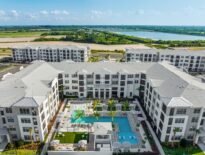Asking rents for life science space in Greater Boston have declined 10 percent from 2022’s peak and landlords are likely to offer further concessions amid a recent uptick in sublease space.
After stabilizing at around 2 million square feet, the sublease inventory increased to 2.9 million square feet, JLL reported in its first-quarter life sciences report. The latest uptick points toward further declines in rents throughout 2024.
“With all of these wild card subleases and landlords that are looking to do whatever they need to do to get their first deal in the building, it’s really hard to establish where the market rate is in any submarket,” said Robert RIchards, executive managing director at JLL Boston.
The market-wide availability rate of 31 percent translates to 17 million square feet of lab space seeking tenants.
Demand for lab space increased 80 percent in the first quarter, driven by Boston-based Vertex Pharmaceuticals’ potential headquarters relocation and a group of smaller space requirements.
Vertex Pharmaceuticals is exploring its options in the Seaport District, which has a double-digit vacancy rate, as its original lease expires in 2028 at its 1.1- million-square-foot Fan Pier headquarters that opened in 2014. New projects such as 10 World Trade and the office-to-lab conversion known as Seaport Science Center at 601 Congress St. still are seeking their first lease commitments.
Vertex has toured numerous lab sites in the Seaport, the Boston Globe reported, focusing on the marine park area where it leased a pair of buildings on Drydock Avenue in recent years.
Beyond the Vertex requirement, which comprises one third of the market’s demand, leasing activity appears sluggish in the near term with most companies seeking under 20,000 square feet.
At the same time, the development pipeline is slowing, with 7.4 million square feet under construction in Greater Boston but only 1.1 million square feet of unleased space set to deliver after 2024.
Responding to cash-strapped biotech companies’ financial needs, developers now have built out more than 80 spec suites in the urban market, JLL reported.
Core markets in Boston’s Seaport and Cambridge have remained the most resilient, with an availability rate of 21 percent compared with 26 percent in the suburbs and 52 percent in non-core submarkets.









